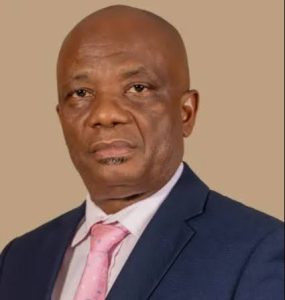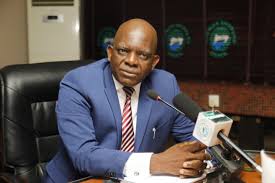Captain Sunday Umoren is the Secretary General of the Abuja Memorandum of Understanding (MoU) on Port State Control. In this interview with Joshua Yousouph, he speaks extensively of the African Continental Free Trade Area, as well as sundry regional shipping and maritime issues.

Can you share your perspective on the importance of maritime transportation for the success of the African Continental Free Trade Area (AfCFTA)?
The AfCFTA presents a remarkable platform to revitalize intra-African trade, which has been nearly non-existent. Trade thrives when goods can be effectively moved from sellers to consumers, and Africa is fortunate to have various transportation options. However, with 38 littoral countries, 13 million square kilometers of Exclusive Economic Zones, and over 47,000 km of coastline, maritime transportation holds tremendous potentials to facilitate trade and regional integration across the continent. Let’s ask ourselves a rhetorical question: Can AfCFTA succeed without maritime transportation? The answer is no. Maritime shipping remains essential, especially given that over 80% of global trade is transported by sea. For developing regions, this figure is even higher; I estimate around 95% for Africa. So, effective maritime operations are absolutely crucial to AfCFTA’s objectives.
What does AfCFTA aim to achieve, and how would the maritime sector support these goals?
AfCFTA’s objective is to create a single market across Africa, boosting intra-African trade by addressing trading obstacles among members. Today, intra-African trade stands at only about 10% compared to 60% in Europe, 40% in North America, and 30% in ASEAN. AfCFTA has the potential to raise this to 20% by fostering cross-border trade. The United Nations Economic Commission for Africa estimates that full AfCFTA implementation could double maritime freight from 58 to 131.5 million tons. However, this growth will require a substantial investment in maritime infrastructure, ships, and services.
You mentioned the need for substantial investment. What exactly does Africa need to be fully prepared?
UNCTAD projects that to fully-implement AfCFTA, Africa would need 100 additional ships and robust investments in transport equipment and infrastructure. We need to overcome challenges like inadequate ports, reliance on foreign ships, lack of digitalization, and limited investment in ship ownership. Without these improvements, Africa risks missing out on AfCFTA’s opportunities.
What impact does Africa’s reliance on foreign vessels have on trade?
We lose a significant portion of potential income to foreign shipowners. Studies show that African countries are at the bottom in ship ownership, just above Oceania. This reliance means that a large portion of freight revenue goes to foreign interests. There’s a need to develop our ship ownership capacity as part of a larger maritime cluster that includes fleet management, ship repairs, and shipbuilding.
Africa is short of vessels as most of the vessels operating at even Dangote Refinery do not belong to Nigeria. How much do you think Nigeria is losing as a result of this?
I can’t give you a figure, because I haven’t carried out that study yet. It’s for the government to commission that study. In other countries and other climes, we have individual organizations that will conduct such studies and come up with a figure. What is clear however, is that foreign vessels reap benefits that would otherwise go to Nigerians. Even on a basic level, the crew could be Nigerians, earning in dollars and repatriating money back home. These are missed opportunities that affect our economy directly. So there are some shortfalls caused by such actions. But like I said, this is what the national authorities should conduct a research on and then present the report to the state. It will be better if we can use our vessels.
How can we encourage African countries to invest in their own ships?
The African Union has encouraged a “Buy in Africa” and “Made in Africa” approach to boost intra-African trade. We need to create incentives for African nations to own ships, promote indigenous participation in regional maritime trade, and limit the use of foreign vessels in regional coastal trade. This will protect our shipping industry, create jobs for African seafarers, and build technical expertise within the continent.
What specific maritime infrastructure does Africa need to develop?
Our ports need to be modernized and digitalized to increase efficiency. Right now, Africa lags behind other regions in terms of active ports, smart and green infrastructure, and digital systems. This is an area where substantial investment is necessary; if we hope to support the increase in trade that AfCFTA promises.
What are the major challenges Africa faces in realizing this maritime vision for AfCFTA?
We face several challenges, including raising substantial investment, improving port infrastructure, addressing environmental concerns, and streamlining regulatory frameworks. Limited digitalization, high trade costs, especially for landlocked countries, and a lack of efficient trade facilitation measures further complicate our progress. We also need to improve maritime networks and develop financial mechanisms that support African-owned enterprises in the sector.
How can stakeholders work together to address these challenges?
Collaboration is key. The Abuja MoU Secretariat works closely with member states, maritime organizations, training institutions, and global partners to meet our objectives. We’re involved in capacity building, implementing standardization, and enhancing communication between maritime administrations and port authorities. For example, we’ve collaborated with the Maritime Anti-Corruption Network and the European Maritime Safety Agency to train officers on integrity and professionalism.
How or what can the African Development Bank do to assist the growth of trade in Africa?
They have been having meetings. The last meeting I attended, the African Development Bank was also there. They are working quite closely. They are working on their protocol. A lot of things are involved because at the end of the day, you need that funding. Everything is about funding and the African Development Bank is poised to support such. I can’t give you specifics. But I know about it currently. They are working together and they are being engaged. I think there’s a programme on the 22nd or the 24th of November, the meeting is going on. So your questions can actually be handled there.
There is this regional bank that is supposed to be domiciled in Nigeria. Do you know the level they are now and don’t you think they should be dragged into the AfCFTA too?
It is a MOWCA thing. MOWCA is strongly in the role of this. The region is pushing for the regional bank to be established as soon as possible. I think the minister has given his word and his support. He’s gathering support from other member states. I can’t tell you exactly what states they are in. But I know that a lot of work is going on there.
You made mention of the fact that we have 22 countries as member states of Abuja MoU, but two are yet to join. Can you give us an update as to why they are yet to join?
The two countries are the Republic of Mauritania and the Republic of Namibia. Last year, we managed to get three in. So it is a decision that comes from the Presidents of those countries and the ministers. They have to agree. Yes, regionally, they are there, but they have not signed up to be a member. But I can assure you, and I want you to quote me, before the middle of next year, I’m getting them on board. I have advanced efforts on this. Before the middle of next year, that’s the worst-case scenario. But I’m targeting to bring them in by the beginning of next year. This is because it’s a net, if all the members are in, the net is closed. Those of us that left this country, if it is broken or one member is not there, there’s a big gap there. So we need to close that net by getting all the members in.
You’ve also mentioned the Near Coastal Voyage (NCV) Code. Could you explain its role?
The NCV Code is aimed at standardizing the operations of vessels within African coastal waters, promoting safe, efficient, and indigenous participation in maritime trade. By enforcing this code, we would enhance the local maritime industry, create employment opportunities, and limit dependency on foreign vessels. This code would provide a regional safety standard for cargo ships over 24 meters long and oil tankers under 500 gross tonnage, facilitating safe trade from Mauritania to South Africa.
You talked about you preferring the old definition to the new definition, that is limiting us to 100 nautical miles. Why is that not reviewed before the NCV code will be passed? And then when are we expecting the new NCV code to come into force?
The NCV code is currently being worked on. We are almost there. Like I said, the President will need to give his approval. We’re hoping to get it out as soon as possible. With respect to that definition, it’s a national thing. By the virtue of my position, I’m a regional person. We don’t criticize our member states. We can actually advise them. As a practitioner, the good part about the new definition is that it states 150 miles, which is good. However, the limiting part is that it’s limited to within Nigeria. It does not cover other countries. So a blend of making it 150 miles and NCV having a general coverage, will be better for the whole country.
What final message would you like to share with Africa’s leaders and investors?
The stage is set for Africa to harness AfCFTA’s potential. Our leaders must prioritize maritime development with a clear roadmap and support indigenous investments in ships and ports. This industry offers Africa a pathway to economic growth and sustainable development, but we must act now. Africa has a wealth of opportunities at its doorstep, and with the right investments and policies, we can transform our economies for future generations.















